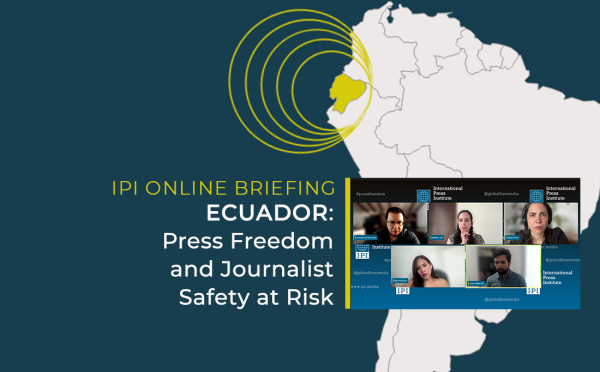The International Press Institute (IPI) today expressed grave disappointment over remarks made by Trinidad and Tobago Prime Minister Kamla Persad-Bissessar during a speech on Monday, in which she asserted that “rogue elements” in the country’s media were “either wilfully or unwittingly misinforming the society” through negative coverage of the government.
In the address, which was given to supporters of the ruling United National Congress (UNC) party, the Prime Minister also responded to criticisms of her record on press freedom by pointing out that the government had supported IPI’s 2012 World Congress.
“While we are very grateful to the Trinidadian government for making our 2012 Congress in Port-of-Spain possible, we are disturbed by recent events involving the media in Trinidad and Tobago,” IPI Executive Director Alison Bethel McKenzie said.
Bethel McKenzie continued: “I have great respect for Prime Minister Kamla Persad-Bissessar, but I am deeply concerned about her statements directed at the media. I have said it once and I will say it again: In a democratic state such as Trinidad and Tobago, newspapers and broadcasters have the right to express their political opinions and report on the issues they—not those in power—deem newsworthy. We urge the Trinidadian government to end this pattern of ugly rhetoric seemingly intended to discredit the press.”
She added: “Press freedom does not include a government forcing the media to air its propaganda.”
Persad-Bissessar had prefaced her comments by insisting they “should not be construed as an attack on the media freedom but the evidence before me is troubling and it should trouble all of us citizens.”
That evidence, she explained, “is that some so-called media professionals are not being fair to this government and are not reporting on the achievements and successes of the government.” The Prime Minister also implied that the Media Association of Trinidad and Tobago (MATT) had prioritised defending journalists’ rights over ensuring truthful reporting.
Those accusations were roundly rejected by MATT’s president, Suzanne Sheppard, who pointed to specific examples of positive coverage of Persad-Bissessar’s government, but (more importantly) added: there is “a big difference between media and public relations.”
Sheppard also noted that individuals “aggrieved” by media coverage have recourse to a Media Complaints Council, the country’s telecommunications authority, as well as civil actions for defamation.
The Trinidad Express wrote in an editorial on Wednesday that it was “becoming increasingly difficult to resist the notion that the Government has embarked on a deliberate strategy to intimidate and discredit the media.” In apparent reference to alleged negative coverage of the Persad-Bissessar administration, the Express noted: “Shooting the messenger is one of the oldest ploys against the media.”
Persad-Bissessar is far from the only government figure to have criticised the Trinidadian media in recent times. In support of the Prime Minister’s remarks, National Security Minister Jack Warner on Wednesday declared that “too many negative things get too much of the spotlight.” Last year, Warner was alleged to have led a campaign to discredit a prominent investigative journalist by spreading insinuations about her private life.
In Oct. 2012, IPI condemned as “highly inappropriate” personal e-mail messages sent to another well-respected journalist by Communications Minister Jamal Mohammed accusing Express of being prejudiced against the ruling People’s Partnership and asserting that the media “have embarked on a sad journey to discredit and destroy.”
Mohammed has also followed through on a controversial plan, announced last fall, to compel all private radio and television stations to carry up to one hour of government programming per day.
Both Persad-Bissessar and then-Trinidadian President George Maxwell Richards spoke at IPI’s June 2012 World Congress in Trinidad. On that occasion, Prime Minister Persad-Bissessar’s reiterated her country’s commitment to press freedom and last November confirmed the government’s intention to repeal criminal-defamation laws, a move welcomed by IPI.
Bethel McKenzie added: “I have full faith in Prime Minister Kamla Persad-Bissessar’s commitment to press freedom going forward, which should include the promised repeal of criminal defamation. But the Trinidadian government’s recent actions toward the media cannot be ignored. I look forward to discussing these issues with representatives of both the government and the media when IPI returns to Trinidad and Tobago to conduct a press freedom mission very soon.”
IPI is increasingly concerned about press freedom not just in Trinidad and Tobago, but across the Caribbean. Most troublingly, independent Cuban journalist Calixto Martínez has been imprisoned since Sept. 2012 for “expressing contempt” toward Fidel and Raúl Castro. Martínez was arrested shortly after reporting on the Cuban government’s response to a cholera outbreak.
Last month, IPI published a comprehensive report on criminal defamation laws in the Caribbean. IPI found that all 16 independent states in the Caribbean maintain some form of criminalised defamation and that six–Antigua and Barbuda, Cuba, the Dominican Republic, Grenada, Haiti, and Suriname–had recently used these to prosecute journalists. Two journalists were sentenced to prison in the Dominican Republic for libel in 2012 alone.


